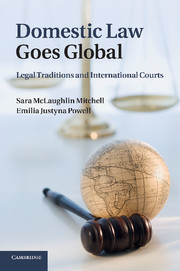Book contents
- Frontmatter
- Contents
- List of figures
- List of tables
- List of boxes
- Acknowledgments
- List of acronyms
- 1 The creation and expansion of international courts
- 2 Major legal traditions of the world
- 3 A rational legal design theory of international adjudication
- 4 Domestic legal traditions and the creation of the International Criminal Court
- 5 Domestic legal traditions and state support for the World Court
- 6 The rational design of state commitments to international courts
- 7 The consequences of support for international courts
- 8 Conclusion
- References
- Index
3 - A rational legal design theory of international adjudication
Published online by Cambridge University Press: 21 April 2011
- Frontmatter
- Contents
- List of figures
- List of tables
- List of boxes
- Acknowledgments
- List of acronyms
- 1 The creation and expansion of international courts
- 2 Major legal traditions of the world
- 3 A rational legal design theory of international adjudication
- 4 Domestic legal traditions and the creation of the International Criminal Court
- 5 Domestic legal traditions and state support for the World Court
- 6 The rational design of state commitments to international courts
- 7 The consequences of support for international courts
- 8 Conclusion
- References
- Index
Summary
The proliferation of international courts and tribunals in the international system over the past century poses an interesting puzzle for exploration. Why has the number of international courts and the power that they wield increased despite the significant intrusion such courts can have on state sovereignty? The ICC, for example, requires mandatory jurisdiction for signatories to the Rome Statute and allows for an independent prosecutor to initiate proceedings regarding crimes against humanity when member states are unwilling or unable to do so. The ECJ is similar in that members of the EU are required to accept the court's jurisdiction. Even in situations where states can place reservations on their commitments to international courts, it is difficult to anticipate all future situations that might arise that could disadvantage states, as the United States realized in 1986 in light of the Nicaragua case before the ICJ.
The expansion of international adjudication is puzzling from a traditional realist perspective, where the existence of an anarchic system implies that courts might not work well globally because they are not backed by a coercive authority. One possible solution to this quandary is for a global or regional hegemon to step in and help create an international or regional court and then act as an enforcer for the court. For example, the Central American Court of Justice was arguably most effective when regional powers, such as the United States and Mexico, were willing to support the court's rulings (Allain 2000).
- Type
- Chapter
- Information
- Domestic Law Goes GlobalLegal Traditions and International Courts, pp. 68 - 95Publisher: Cambridge University PressPrint publication year: 2011



